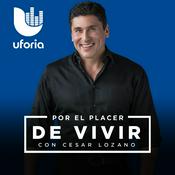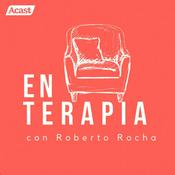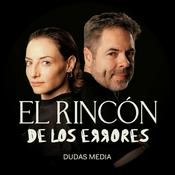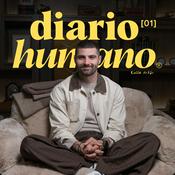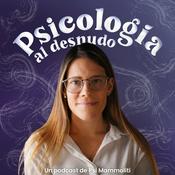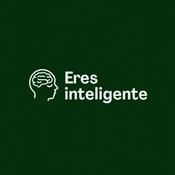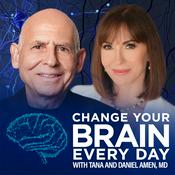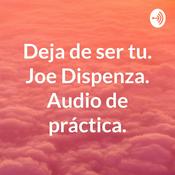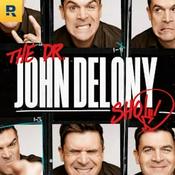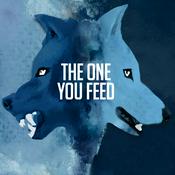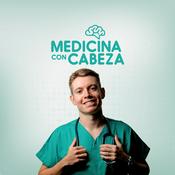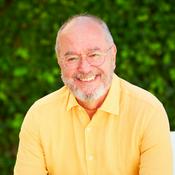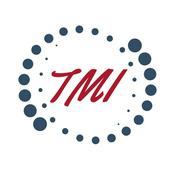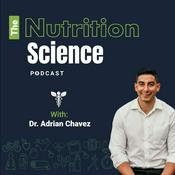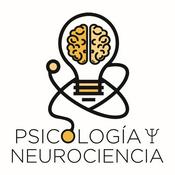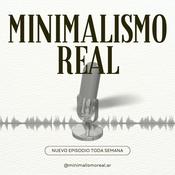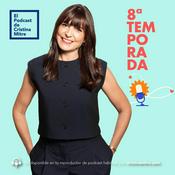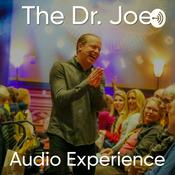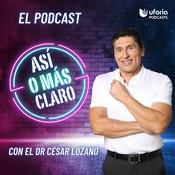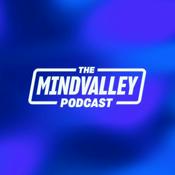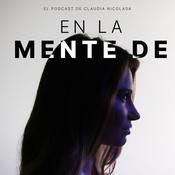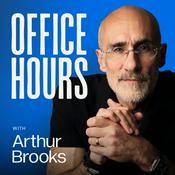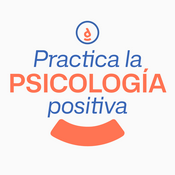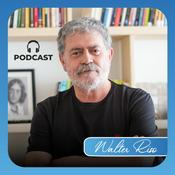365 episodios
- Psychiatrist Jennifer Derenne specializes in eating disorders. Most eating disorders begin in adolescence, but they can appear much earlier – or later – in life, too. To begin healing, Derenne works with an interdisciplinary team to first stabilize and renourish her patients and uses evidence-based psychotherapy that incorporates strong family involvement. Recent clinical studies are exploring the use of psychedelics to open new avenues for treating these notoriously hard-to-treat illnesses. Eating disorders are a life-threatening medical condition, Derenne asserts, telling host Russ Altman that “food is the best medicine” on this episode of Stanford Engineering’s The Future of Everything podcast.
Have a question for Russ? Send it our way in writing or via voice memo, and it might be featured on an upcoming episode. Please introduce yourself, let us know where you're listening from, and share your question. You can send questions to [email protected].
Episode Reference Links:
Stanford Profile: Jennifer L. Derenne, MD
Connect With Us:
Episode Transcripts >>> The Future of Everything Website
Connect with Russ >>> Threads / Bluesky / Mastodon
Connect with School of Engineering >>> Twitter/X / Instagram / LinkedIn / Facebook
Chapters:
(00:00:00) Introduction
Russ Altman introduces guest Jennifer Derenne, a professor of psychiatry and behavioral sciences at Stanford University.
(00:03:11) Studying Eating Disorders
Jennifer’s path from pediatrics to psychiatry and studying eating disorders.
(00:03:44) Types of Eating Disorders
A breakdown of the main diagnoses and what distinguishes them.
(00:04:59) Who Gets Eating Disorders?
The age ranges of those affected and when symptoms first appear.
(00:05:46) Disordered Vs. Normal Eating
Distinguishing common weight concerns from dangerous dysfunction.
(00:07:15) Treating Teen Eating Disorders
Why family involvement is crucial and treatment focuses on behaviors.
(00:08:56) Genetics & Social Media
The different risk factors that can contribute to disordered eating.
(00:10:08) Smartphones & Mental Health
The impact of smartphones on the development of coping mechanisms.
(00:12:32) Transitioning to College
Why mental health can destabilize during the move to independence.
(00:15:51) Treating Eating Disorders
The multidisciplinary approach to treating disordered eating.
(00:18:39) Supervision & Safety
The importance of supervision and medical follow-ups to help prevent relapse.
(00:21:03) AI in Adolescent Psychiatry
The pros and cons of AI tools in adolescent mental health support.
(00:25:21) The Limits of Medication
How medications often target comorbidities rather than the eating disorder itself.
(00:27:08) Psychedelics Research
Emerging studies on using psychedelics in the treatment of eating disorders.
(00:29:47) Future In a Minute
Rapid-fire Q&A: curiosity, treatment optimism, and becoming a book editor.
(00:31:48) Conclusion
Connect With Us:
Episode Transcripts >>> The Future of Everything Website
Connect with Russ >>> Threads / Bluesky / Mastodon
Connect with School of Engineering >>>Twitter/X / Instagram / LinkedIn / Facebook
Hosted by Simplecast, an AdsWizz company. See pcm.adswizz.com for information about our collection and use of personal data for advertising. - Spring is right around the corner and as the weather changes and things begin to bloom, that also means the onset of allergy season. Last fall, we sat down with Tina Sindher who shared that while allergies may be affecting more people worldwide, prevention is playing catch up. If you’re someone or know someone who lives with environmental or food allergies, we hope you’ll tune into this episode to hear some of Tina’s strategies for better managing these conditions.
Have a question for Russ? Send it our way in writing or via voice memo, and it might be featured on an upcoming episode. Please introduce yourself, let us know where you're listening from, and share your question. You can send questions to [email protected].
Episode Reference Links:
Stanford Profile: Sayantani (Tina) Sindher
Connect With Us:
Episode Transcripts >>> The Future of Everything Website
Connect with Russ >>> Threads / Bluesky / Mastodon
Connect with School of Engineering >>> Twitter/X / Instagram / LinkedIn / Facebook
Chapters:
(00:00:00) Introduction
Russ Altman introduces guest Tina Sindher, a professor of medicine and allergy at Stanford University.
(00:01:50) Inside the Immune Response
Why our immune systems trigger allergic reactions.
(00:03:31) Genes vs. Environment
Whether genetics or environment drive allergy risks.
(00:06:39) The Microbiome Factor
The role of the microbiome and early exposures in prevention.
(00:07:51) A Global Allergy Surge
How global allergy trends reveal rising health challenges.
(00:10:29) Potent Food Triggers
Why some foods cause stronger and faster reactions.
(00:12:23) Emerging Risks
Whether Alpha-Gal signals new emerging allergy risks.
(00:14:21) Multi-Food Allergies
How multi-food allergies complicate diagnosis and treatment.
(00:17:36) Preventing Allergies Early
Why early food introduction may help prevent allergies.
(00:19:28) Skin’s Role in Allergies
The importance of infant skin health in allergy development.
(00:22:13) Testing Limitations
The limits of current testing methods to truly diagnose allergies.
(00:23:47) Standard Testing Procedure
The current methodologies deployed when testing for allergies.
(00:26:02) New Therapies
How new therapies like OIT and Xolair are reshaping treatment.
(00:30:24) The Future of Allergies
The potential of combined therapies to aid in allergy treatment.
(00:33:07) Managing Seasonal Allergies
How to manage seasonal allergies effectively at home.
(00:35:41) Conclusion
Connect With Us:
Episode Transcripts >>> The Future of Everything Website
Connect with Russ >>> Threads / Bluesky / Mastodon
Connect with School of Engineering >>>Twitter/X / Instagram / LinkedIn / Facebook
Hosted by Simplecast, an AdsWizz company. See pcm.adswizz.com for information about our collection and use of personal data for advertising. - Chuck Eesley, a professor of management science and engineering, studies entrepreneurship across diverse contexts – from refugee entrepreneurs in Uganda to semiconductor startups navigating U.S.-China economic policy. His research on recent export controls revealed a counterintuitive outcome: Rather than solely strengthening U.S. semiconductor innovation, these policies accelerated Chinese investment in its own domestic chip industry, boosting startups there as much as – or more than – here. This finding underscores how global technology markets are deeply interconnected: Barriers can produce unintended consequences that accelerate innovation abroad rather than protecting it at home. Open technology trade and investment create larger markets for American innovations, strengthen collaborative partnerships, and demonstrate that interconnected markets drive progress for all participants. “Entrepreneurial talent exists everywhere,” Eesley tells host Russ Altman on this episode of Stanford Engineering’s The Future of Everything podcast.
Have a question for Russ? Send it our way in writing or via voice memo, and it might be featured on an upcoming episode. Please introduce yourself, let us know where you're listening from, and share your question. You can send questions to [email protected].
Episode Reference Links:
Stanford Profile: Charles (Chuck) Eesley
Connect With Us:
Episode Transcripts >>> The Future of Everything Website
Connect with Russ >>> Threads / Bluesky / Mastodon
Connect with School of Engineering >>> Twitter/X / Instagram / LinkedIn / Facebook
Chapters:
(00:00:00) Introduction
Russ Altman introduces guest Chuck Eesley, a professor of management and engineering at Stanford University.
(00:03:04) Why Study Entrepreneurship?
Chuck explains why entrepreneurs are drivers of modern economic growth.
(00:03:30) Defining Entrepreneurship
Broad vs. narrow entrepreneurship, from startups to large organizations.
(00:04:33) Institutional Environments
How policies and culture both shape entrepreneurial outcomes.
(00:05:44) Studying Institutions & Entrepreneurship
Measuring institutional shifts to isolate entrepreneurial outcomes.
(00:08:12) Founder & Talent Incentives
What’s needed for high-opportunity-cost talent to start companies.
(00:09:36) AI Entrepreneurship
The impact of data and compute concentration on startup dynamism.
(00:11:28) Designing AI Regulation
Historical examples of regulation enabling startups to compete fairly.
(00:13:43) Incentives Inside Big Tech
Why some incumbents support startups while others tilt the playing field.
(00:15:28) Ad Placement & Misinformation Funding
How digital advertising can unintentionally fund low-credibility content.
(00:21:24) Misinformation Market Solution
The disclosure mechanisms that may reduce misinformation incentives.
(00:25:23) Semiconductors & Entrepreneurship
The importance of startups in a field often dominated by large incumbents.
(00:29:30) Unintended Policy Effects
How U.S. policy may be accelerating Chinese semiconductor investments.
(00:31:09) Competing Industrial Policies
Why evaluation and iteration are essential for effective policy design.
(00:32:31) Global Entrepreneurship
Emerging entrepreneurship models spreading across regions and contexts.
(00:36:26) The Universal Entrepreneurial Mindset
Shared entrepreneurial traits across cultures, contexts, and countries.
(00:37:14) Future In a Minute
Rapid-fire Q&A: democratizing entrepreneurship, context, and equitable inclusivity.
(00:41:02) Conclusion
Connect With Us:
Episode Transcripts >>> The Future of Everything Website
Connect with Russ >>> Threads / Bluesky / Mastodon
Connect with School of Engineering >>>Twitter/X / Instagram / LinkedIn / Facebook
Hosted by Simplecast, an AdsWizz company. See pcm.adswizz.com for information about our collection and use of personal data for advertising. - Developmental psychologist Bonnie Halpern-Felsher specializes in teenage health-related decision-making, especially in their use of tobacco, alcohol, cannabis, and other substances. Young people, she says, value immediate social benefits over long-term risks. In response, she supports bans on flavored nicotine products and has developed nationally and internationally used evidence-based substance use prevention and intervention programs, including some that are culturally targeted, such as her vaping prevention curriculum in Hawaii zeroing in on popular flavors like mango and poi. The reward, she says, is reduced substance use and better mental health. “Talk to your kids. Don’t lecture. Have a conversation,” Halpern-Felsher tells host Russ Altman of the best way to break through on this episode of Stanford Engineering’s The Future of Everything podcast.
Have a question for Russ? Send it our way in writing or via voice memo, and it might be featured on an upcoming episode. Please introduce yourself, let us know where you're listening from, and share your question. You can send questions to [email protected].
Episode Reference Links:
Stanford Profile: Bonnie Halpern-Felsher
Halpern-Felsher REACH Lab | Stanford Medicine
Connect With Us:
Episode Transcripts >>> The Future of Everything Website
Connect with Russ >>> Threads / Bluesky / Mastodon
Connect with School of Engineering >>> Twitter/X / Instagram / LinkedIn / Facebook
Chapters:
(00:00:00) Introduction
Russ Altman introduces guest Bonnie Halpern-Felsher, a developmental psychologist at Stanford University.
(00:03:52) Focus on Youth Substance Use
Bonnie explains her focus on studying substance behaviors in adolescents.
(00:05:32) Current Trends in Youth Health
The mixed indicators across behavior and mental health in youth.
(00:08:46) Effective Health Communication
Why long-horizon risk messaging often underperforms in adolescents.
(00:11:16) Policy Translation & Advocacy
How Bonnie translates research findings into policy advocacy.
(00:13:54) School-Based Prevention Programs
An overview of evidence-based curricula and target age groups.
(00:15:04) Measuring Program Impact
The evaluation approaches and challenges of the prevention programs.
(00:16:41) Youth Dependence & Cessation
Why addiction develops quickly and the limited treatment options.
(00:18:18) Program Adaptation Across Contexts
How curricula are localized without redesigning core methods.
(00:21:00) Youth-Oriented Product Marketing
The strategies used by substance industries to market to youth.
(00:23:38) Cannabis Potency & Health Risk
The link between higher THC concentrations and medical outcomes.
(00:26:48) Patterns of Cannabis Use
The common modes of cannabis use and related exposure risks.
(00:28:10) Early Exposure & Prevention Needs
The reports of substance exposure and use at increasingly early ages.
(00:29:10) Guidance for Caregivers
Practical guidance for caregivers concerned about substance use.
(00:31:23) Future In a Minute
Rapid-fire Q&A: asking for help, substance regulation, and alternate degree.
(00:33:37) Conclusion
Connect With Us:
Episode Transcripts >>> The Future of Everything Website
Connect with Russ >>> Threads / Bluesky / Mastodon
Connect with School of Engineering >>>Twitter/X / Instagram / LinkedIn / Facebook
Hosted by Simplecast, an AdsWizz company. See pcm.adswizz.com for information about our collection and use of personal data for advertising. - As 2026 gets underway we know that many take time around this new beginning to improve not only their physical, but also their mental health. With that in mind, we’re rerunning an episode with Leanne Williams on the future of depression care. Leanne is an expert on clinical depression and is working on new ways to more precisely diagnose depression in order to develop more effective treatment. For anyone who has suffered from depression or knows someone who has, it’s an episode that provides hope for what’s on the horizon. We hope you’ll take another listen and also share this episode with anyone who you think may benefit from the conversation.
Have a question for Russ? Send it our way in writing or via voice memo, and it might be featured on an upcoming episode. Please introduce yourself, let us know where you're listening from, and share your question. You can send questions to [email protected].
Episode Reference Links:
Stanford Profile: Leanne Williams
Connect With Us:
Episode Transcripts >>> The Future of Everything Website
Connect with Russ >>> Threads / Bluesky / Mastodon
Connect with School of Engineering >>> Twitter/X / Instagram / LinkedIn / Facebook
Chapters:
(00:00:00) Introduction
Russ Altman introduces guest Leanne Williams, a professor of Psychiatry and Behavioral Science at Stanford University.
(00:01:43) What Is Depression?
Distinguishing clinical depression from everyday sadness.
(00:03:31) Current Depression Treatment Challenges
The trial-and-error of traditional depression treatments and their timelines.
(00:06:16) Brain Mapping and Circuit Dysfunctions
Advanced imaging techniques and their role in understanding depression.
(00:09:03) Diagnosing with Brain Imaging
How brain imaging can complement traditional diagnostic methods in psychiatry.
(00:10:22) Depression Biotypes
Identifying six distinct biotypes of depression through brain imaging.
(00:12:31) Cognitive Features of Depression
How cognitive impairment plays a major role in certain depression biotypes.
(00:14:11) Matching Treatments to Biotypes
Finding appropriate treatments sooner using brain-based diagnostics.
(00:15:38) Expanding Treatment Options
Personalizing therapies and improving treatment outcomes based on biotypes.
(00:19:03) AI in Depression Treatment
Using AI to refine biotypes and predict treatment outcomes with greater accuracy.
(00:22:15) Psychedelics in Depression Treatment
The potential for psychedelic drugs to target specific biotypes of depression.
(00:23:46) Expanding the Biotypes Framework
Integrating multimodal approaches into the biotype framework.
(00:27:29) Reducing Stigma in Depression
How showing patients their brain imaging results reduces self-blame and stigma.
(00:29:38) Conclusion
Connect With Us:
Episode Transcripts >>> The Future of Everything Website
Connect with Russ >>> Threads / Bluesky / Mastodon
Connect with School of Engineering >>>Twitter/X / Instagram / LinkedIn / Facebook
Hosted by Simplecast, an AdsWizz company. See pcm.adswizz.com for information about our collection and use of personal data for advertising.
Más podcasts de Salud y forma física
Podcasts a la moda de Salud y forma física
Acerca de The Future of Everything
Host Russ Altman, a professor of bioengineering, genetics, and medicine at Stanford, is your guide to the latest science and engineering breakthroughs. Join Russ and his guests as they explore cutting-edge advances that are shaping the future of everything from AI to health and renewable energy.
Along the way, “The Future of Everything” delves into ethical implications to give listeners a well-rounded understanding of how new technologies and discoveries will impact society. Whether you’re a researcher, a student, or simply curious about what’s on the horizon, tune in to stay up-to-date on the latest developments that are transforming our world.
Sitio web del podcastEscucha The Future of Everything, On Purpose with Jay Shetty y muchos más podcasts de todo el mundo con la aplicación de radio.net
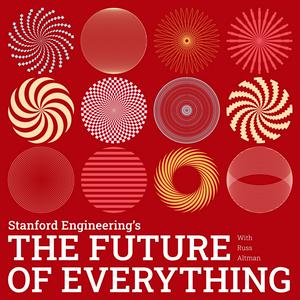
Descarga la app gratuita: radio.net
- Añadir radios y podcasts a favoritos
- Transmisión por Wi-Fi y Bluetooth
- Carplay & Android Auto compatible
- Muchas otras funciones de la app
Descarga la app gratuita: radio.net
- Añadir radios y podcasts a favoritos
- Transmisión por Wi-Fi y Bluetooth
- Carplay & Android Auto compatible
- Muchas otras funciones de la app


The Future of Everything
Escanea el código,
Descarga la app,
Escucha.
Descarga la app,
Escucha.



